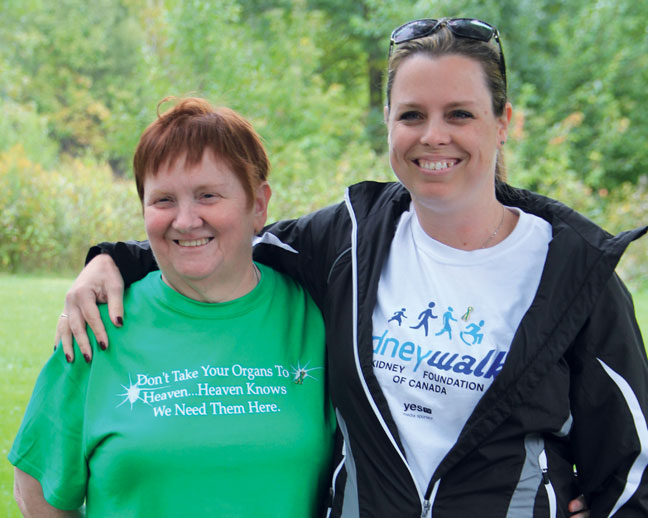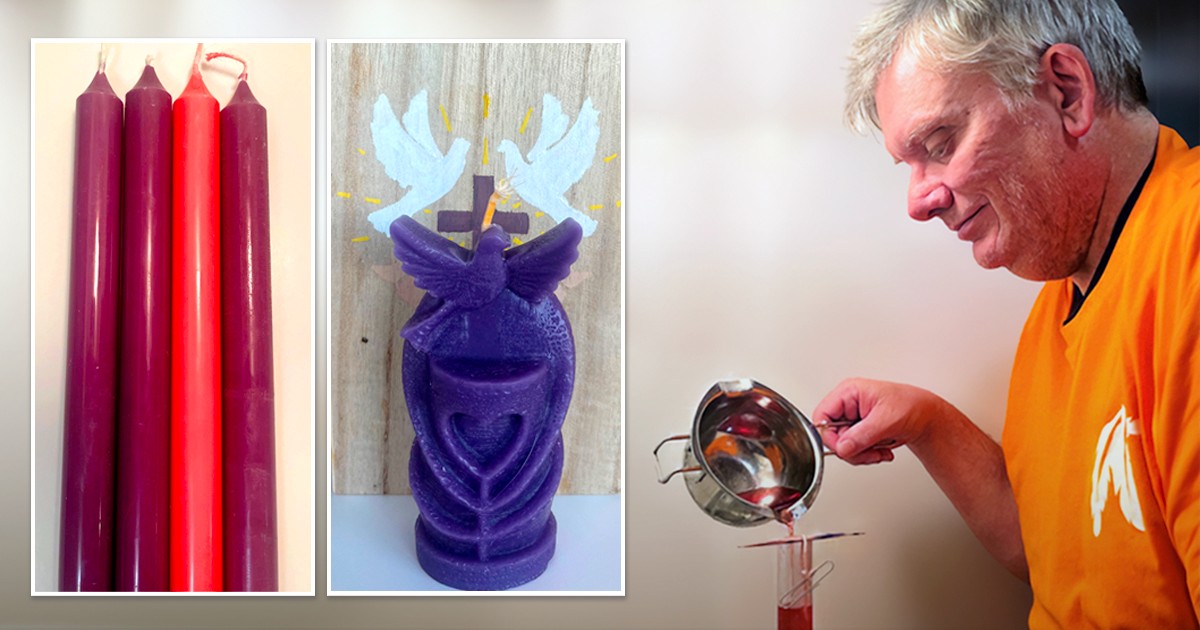In May 2013, Major Debra Beaupre, executive director of London Village in Ontario, was admitted to the hospital after seeing her kidney specialist. For many years, her kidney disease had been under control, but now she was in pain and having trouble breathing.
“I had all these sores on my body,” she says. “My kidneys weren't taking the toxins out, so they were coming out on my skin. I felt like I had leprosy.”
She started dialysis right away. At first, it was three days a week, four hours at a time, at the hospital. Eventually, she was able to switch to peritoneal dialysis, a treatment she could do at home. Although she felt better, adjusting to life on dialysis wasn't easy.
“You do it every single night, for eight hours,” she says. “You have to plan when to go to bed. You need to lay the right way, or the alarm goes off. If you need to get up in the night, you have to disconnect and reconnect the machine. If you need to travel, you have to bring it with you.
“It changes your life in so many ways.”
Major Beaupre was eligible for a kidney transplant, and had a friend step forward who was willing to be a donor, but their blood types weren't compatible. They signed up for a national registry program that identifies pairs who could exchange donors, hopeful they would find a match. They entered the pair chain three times, and three times it didn't work.
It was a frustrating time. “Sometimes the road is smooth and other times it's like you've rammed into construction, and can't find a way out. You feel overwhelmed, like, what did I do to deserve this?” she says. “But I have the most amazing friends, who have walked with me. And my faith is what kept me strong. When I got discouraged, I could turn to God and say, 'I don't understand this, but I know you're in control.' ”
Two years later, Major Beaupre was chatting with Dean Gregory, the chaplain at London Village, when his wife, Jenna, stopped by. “She handed me a can of kidney beans, and said, 'The doctors tell me you need a kidney, and I just found out mine's good to go,' ” says Major Beaupre. “I had to pick myself up off the floor.”
“The first time I met Deb, she was in the hospital. She'd had surgery and there were complications—she nearly died,” says Jenna Gregory. “When my husband and I found out she needed a kidney donor, we both said, let's get checked.”
After finding out she was an initial match, there was a further barrage of tests—a year's worth in the space of a month. In the end, she was a perfect candidate. “Everything absolutely fell into place. I saw God's hand all over this,” says Gregory.
Even though she didn't know Major Beaupre that well, Gregory didn't hesitate. “Everybody is born with two kidneys, but you really only need one. So I think of it as, one is for keeping and one is for sharing,” she says. “It didn't increase my risk of any health complications. How could I not do it?”
On June 24, 2015, Gregory and Major Beaupre underwent transplant surgery. The new kidney started working immediately.
“Once I no longer had to do dialysis, it was like someone took a brick off my chest. It was freedom,” says Major Beaupre. “I had a new lease on life.”
“I'd never seen her with colour in her face. Now, she glows,” says Gregory. “The potential for her to live a long and healthy life because she got a living kidney is through the roof. It was a privilege to be part of it—a huge honour.”
At a follow-up appointment, Major Beaupre's kidney specialist told her that getting a new kidney had been lifesaving.
“It overwhelms me to think that Jenna willingly gave a kidney so that I could live longer. I know it's because God spoke to her heart, and she obeyed. Her heart gave me a kidney,” says Major Beaupre. “I'm so grateful for her gift—a part of her is always with me.”
“I had all these sores on my body,” she says. “My kidneys weren't taking the toxins out, so they were coming out on my skin. I felt like I had leprosy.”
She started dialysis right away. At first, it was three days a week, four hours at a time, at the hospital. Eventually, she was able to switch to peritoneal dialysis, a treatment she could do at home. Although she felt better, adjusting to life on dialysis wasn't easy.
“You do it every single night, for eight hours,” she says. “You have to plan when to go to bed. You need to lay the right way, or the alarm goes off. If you need to get up in the night, you have to disconnect and reconnect the machine. If you need to travel, you have to bring it with you.
“It changes your life in so many ways.”
Major Beaupre was eligible for a kidney transplant, and had a friend step forward who was willing to be a donor, but their blood types weren't compatible. They signed up for a national registry program that identifies pairs who could exchange donors, hopeful they would find a match. They entered the pair chain three times, and three times it didn't work.
It was a frustrating time. “Sometimes the road is smooth and other times it's like you've rammed into construction, and can't find a way out. You feel overwhelmed, like, what did I do to deserve this?” she says. “But I have the most amazing friends, who have walked with me. And my faith is what kept me strong. When I got discouraged, I could turn to God and say, 'I don't understand this, but I know you're in control.' ”
Two years later, Major Beaupre was chatting with Dean Gregory, the chaplain at London Village, when his wife, Jenna, stopped by. “She handed me a can of kidney beans, and said, 'The doctors tell me you need a kidney, and I just found out mine's good to go,' ” says Major Beaupre. “I had to pick myself up off the floor.”
“The first time I met Deb, she was in the hospital. She'd had surgery and there were complications—she nearly died,” says Jenna Gregory. “When my husband and I found out she needed a kidney donor, we both said, let's get checked.”
After finding out she was an initial match, there was a further barrage of tests—a year's worth in the space of a month. In the end, she was a perfect candidate. “Everything absolutely fell into place. I saw God's hand all over this,” says Gregory.
Even though she didn't know Major Beaupre that well, Gregory didn't hesitate. “Everybody is born with two kidneys, but you really only need one. So I think of it as, one is for keeping and one is for sharing,” she says. “It didn't increase my risk of any health complications. How could I not do it?”
On June 24, 2015, Gregory and Major Beaupre underwent transplant surgery. The new kidney started working immediately.
“Once I no longer had to do dialysis, it was like someone took a brick off my chest. It was freedom,” says Major Beaupre. “I had a new lease on life.”
“I'd never seen her with colour in her face. Now, she glows,” says Gregory. “The potential for her to live a long and healthy life because she got a living kidney is through the roof. It was a privilege to be part of it—a huge honour.”
At a follow-up appointment, Major Beaupre's kidney specialist told her that getting a new kidney had been lifesaving.
“It overwhelms me to think that Jenna willingly gave a kidney so that I could live longer. I know it's because God spoke to her heart, and she obeyed. Her heart gave me a kidney,” says Major Beaupre. “I'm so grateful for her gift—a part of her is always with me.”










Comment
On Wednesday, June 29, 2016, Dean Gregory said:
Leave a Comment